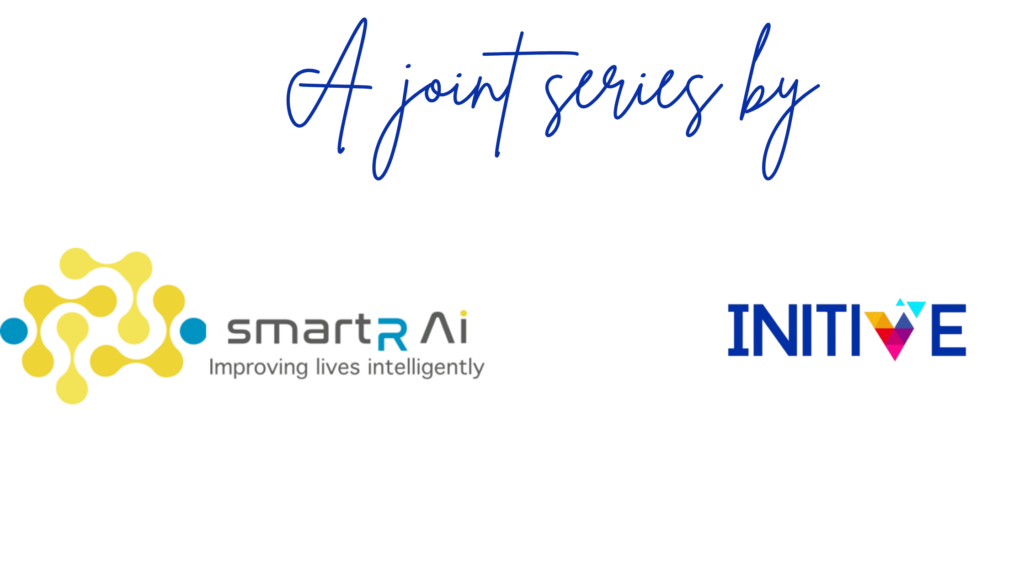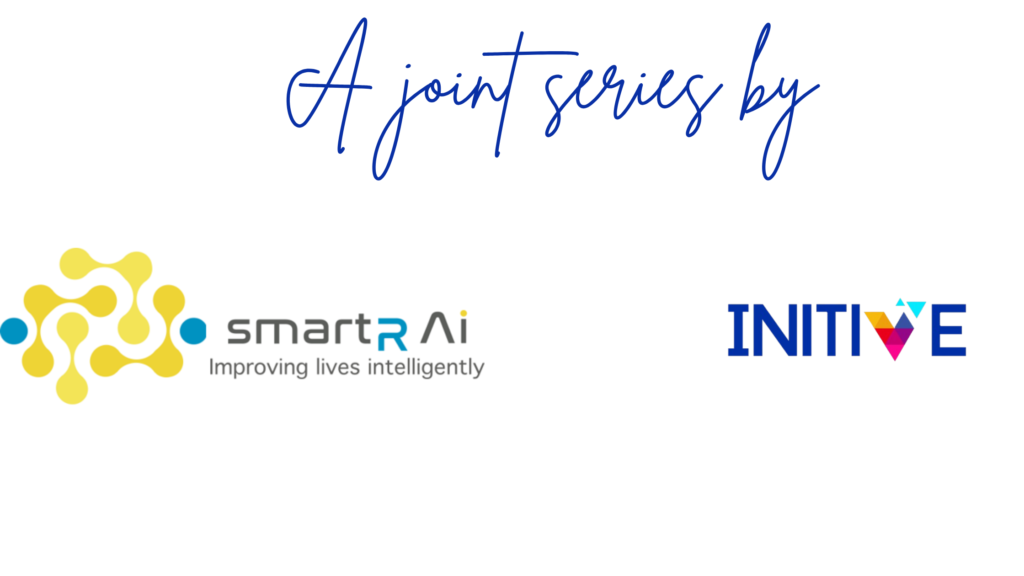
In this co-blogging series with the expertise of smartR AI, we explore how to build AI that truly solves business problems.
AI has incredible potential but only when it’s used strategically. Too many companies start building AI tools without a clear business case, measurable goals, or long-term ROI in mind.
At Initive, we help decision-makers discover AI solutions aligned with their real business challenges so they invest where it counts.
In this series, we’re teaming up with smartR AI to bring you practical guidance on when to build, when to buy, and how to approach AI like a strategist, not a trend chaser.
Now, let’s hand it over to the experts at smartR AI and Oliver King-Smith, founder and CEO, to dive deeper…
Insights in Action
Artificial intelligence (AI) is no longer a futuristic fantasy; it’s a powerful tool transforming businesses across industries. But before you jump headfirst into AI implementation, it’s crucial to assess your readiness and approach the integration strategically. This blog post provides a practical framework for evaluating your AI readiness, identifying high-ROI opportunities, and navigating the path to successful AI adoption.
Assessing your AI readiness: Are you ready for the leap?
Before investing in AI, you need to understand your current capabilities and identify areas for improvement. Here’s a framework to help you:
Self-Assessment checklist: Use this checklist to evaluate your current position:
· Do we have clearly defined business problems we’re trying to solve?
· Do we have the right data available (quality, quantity, accessibility)?
· Do we have skilled personnel (data scientists, engineers, domain experts)?
· Do we have the budget and infrastructure to support AI development/implementation?
· Do we have executive buy-in and a clear AI strategy?
Maturity model: Consider where your company falls on an AI maturity scale:
· Aware: Basic understanding of AI, exploring potential use cases.
· Pilot: Running small-scale AI projects, experimenting with different solutions.
· Operational: Implementing AI solutions across multiple departments, with defined processes and measurable results.
· Optimized: AI deeply integrated into core business processes, continuously improving and adapting.
Gap Analysis: Compare your current capabilities (data infrastructure, skills, processes) against the requirements of potential AI projects. This will highlight areas that need attention before you can successfully implement AI.
Finding the right problems to solve: Identifying high-ROI opportunities
Not all AI projects are created equal. To maximize your investment, focus on opportunities with the greatest potential return.
Focus on pain points: Start by identifying your biggest business challenges:
· High operational costs
· Inefficient processes
· Poor customer satisfaction
· Missed revenue opportunities
Data-driven discovery: Use data analysis to uncover hidden problems. For example, analyze customer support tickets to find recurring issues or analyze sales data to identify areas for improvement.
Prioritization framework: Evaluate potential AI projects using this framework:
· Potential ROI: Cost savings, revenue increase, etc.
· Feasibility: Data availability, technical complexity.
· Strategic Alignment: How the project supports overall business goals.
· Ease of Implementation: How easy it is to deploy the project.
Start Small and focused: Begin with well-defined, narrow-scope projects. These projects are easier to implement, and provide valuable experience.
Strategies for Successful AI Projects: Learning from Success and Failure
AI implementation can be complex, but these strategies increase your chances of success:
Bring in outside expertise: For stalled projects, consider bringing in external AI experts to:
· Evaluate the current approach
· Make recommendations for improvement
· Help realign the project with realistic goals
Adopt an engineering mindset: Treat AI projects as complex engineering endeavors:
· Focus on prototyping and iterative development
· Rigorously test and validate solutions
· Integrate AI tools with existing software infrastructure
Develop realistic Business cases: Before initiating an AI project:
· Clearly define the business use case
· Identify which team members or processes will benefit from AI augmentation
· Determine where human involvement is necessary
· Create conservative budgets and timelines
Rethinking AI implementation: AI as a productivity enhancer
A fundamental shift in perspective is needed: AI should be viewed not as a replacement for humans but as a tool to enhance human productivity – in other words Assistive Intelligence. AI excels at:
· Removing drudgery from routine tasks
· Tackling complex problems that are challenging and time-consuming for humans to analyze
· Augmenting human decision-making
However, AI systems still require human guidance and oversight to be truly effective.
Tools and methods to apply today
Here are some practical recommendations:
· Data preparation tools: Explore open-source or affordable data cleaning and pre-processing tools. This is critical for data quality.
· Prototyping Platforms: Use low-code/no-code platforms or cloud-based machine learning services for rapid prototyping.
· Human-in-the-loop strategies: Successful AI projects incorporate humans at critical junctures:
o Problem definition and scoping
o Data preparation and curation
o Model training and fine-tuning
o Output validation and quality control
o Ethical oversight and decision-making
· Start with internal tools: Automate internal processes before customer-facing solutions.
Use Cases:
o Finance: Streamline financial reporting, enhance forecasting, optimize portfolios, and detect anomalies.
o HR: Improve recruitment by automating candidate screening and matching.
o Marketing: Personalize customer experiences through tailored messaging and recommendations.
Mistakes to avoid
Be aware of these pitfalls:
· Ignoring data quality: “Garbage in, garbage out.” Prioritize data cleansing and governance.
· Over-promising and under-delivering: Set realistic expectations.
· Lack of human oversight: Don’t fully automate processes without human review.
· Not having a clear business case: Define the problem, desired outcomes, and success metrics.
· Trying to do too much too soon: Start small and iterate.
· Not investing in training: Provide AI training for your team.
· Over-reliance on vendors: Build internal AI expertise.
· Not considering board oversight: Ensure there is an AI expert on the board.
· Skipping steps in the process: Focus on data quality and realistic expectations.
· Adopting a diffuse approach: Start focused with a few well-defined, narrow-scope projects.
· Ignoring regulatory and ethical implications: Ensure you have a team in place to monitor compliance.
Conclusion
AI offers tremendous potential, but success requires careful planning and execution. By using these frameworks, you can evaluate your readiness, identify high-ROI opportunities, and implement AI solutions strategically. Remember to start small, focus on practical applications, and always prioritize human oversight. By embracing AI thoughtfully, you can unlock significant value and drive your business forward.
Want help identifying the right AI providers for your business? Explore Initive platform
About Oliver King-Smith, smartR AI
Oliver holds a PhD in Mathematics from UC Berkeley and an executive MBA from Stanford, and is an innovator with expertise in Data Visualization, Statistics, Machine Vision, Robotics, and AI. As a serial entrepreneur, he has founded three companies and contributed to two successful exits. At his latest company, smartR AI, Oliver King-Smith spearheads innovative patent applications harnessing AI for societal impact, including advancements in health tracking, support for vulnerable populations, and resource optimization. Throughout his career, Oliver has been dedicated to developing cutting-edge technology to address challenges, and today smartR AI is committed to providing safe AI programs within your own secure and private ecosystems.
LinkedIn profile: https://www.linkedin.com/in/oliverkingsmith/
Email: oliver.king-smith@smartr.ai

Comments